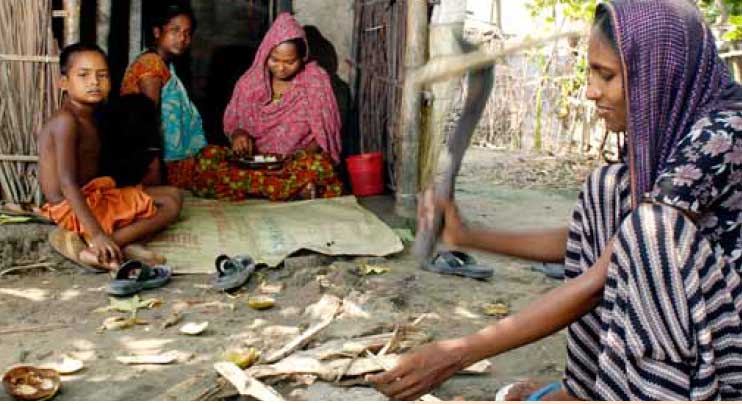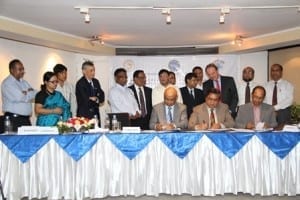Apr 11, 2013

Rula Al-Saffar (left) and Jehan Matooq are among medical professionals in Bahrain where medics continue to experience repression. Credit: Tula Connell
For sick or injured Bahrainis, going to the hospital means risking a prison term—or even death. Describing the “militarization of hospitals,” Rula Al-Saffar, president of the Bahrain Nursing Society, said patients with “head traumas, broken bones or burns” are first interrogated by police to determine if they are involved in protests against the government. Health professionals are only allowed to treat patients after police investigate and clear them for treatment. For some, the delay means death.
In one such instance, “a man fell down the stairs and had a brain hemorrhage,” she said, during an interview at the Solidarity Center. The man could not be treated until the police went to the site to determine if his story was credible. Al-Saffar, in Washington, D.C., this week to update members of Congress and policymakers on the ongoing repression in Bahrain, is among Bahraini medics demanding Bahrain abide by medical neutrality. The Bahrain Center for Human Rights has released a report that details the country’s breach of medical neutrality and violations of injured patients.
Medical neutrality, codified in the Geneva Conventions, is the principle of noninterference with medical services during armed conflict. Internationally recognized, medical neutrality requires the safe transport and treatment of patients and the non-persecution of health professionals for treating ill and injured patients. The issue, says Al-Saffar, is far broader than Bahrain.
“If it happens in Bahrain, it will be the role model in other countries,” she said.
In March, a Bahrain appeals court reversed the conviction of 21 health professionals arrested during pro-democracy protests in 2011. Yet more than two dozen other medics are still in prison. Medics—doctors, nurses and technicians—have been prime targets of government persecution because they treated wounded protestors. Al-Saffar is one of them.
She was put in prison for five months where she was beaten and subject to electro-shock torture. Her 15-year sentence for 12 politically motivated charges was overturned in 2012.
Hassan Matooq, a pediatric nurse, is among those still imprisoned. His younger sister, Jehan Matooq, is traveling in the United States with Al-Saffar to bring attention to his case. Matooq, a medical coordinator for the Bahrain Youth Society for Human Rights, says Hassan was arrested while at work in the pediatric emergency room and given less than 24 hours to find a lawyer to defend him in a military court trial. Unable to contact a lawyer, he was convicted and sentenced to three years in prison for “hatred against the regime,” she said.
The Bahrain Independent Commission of Inquiry last year found that Bahrain officials had grossly exaggerated, if not manufactured, many claims brought against thousands of ordinary people who had been caught up in the 2011 protests, including hundreds of education professionals. Americans for Democracy & Human Rights in Bahrain has issued a detailed list of medics who have been arrested and their current status.
Al-Saffar also described a systematic campaign of terror against Bahraini citizens, in which police tear gas civilians and shoot individuals at close range with pellet guns. Further, Al-Saffar says the regime has barred Sh’ia nursing graduates from getting jobs—despite Bahrain’s severe nation’s nursing shortage. For example, one nurse is responsible for 20 patients at the Samaniya medical complex, the country’s only full-service hospital.
The 2011 peaceful uprising brought together citizens of all religions, but since then, “the government has done a great job of a hatred campaign,” Al-Saffar says. Recently, she has seen signs that the public is not buying such divide-and-conquer efforts. “The people are coming together again.”
Apr 8, 2013

UTRASD President Maria Roa Borja seeks to increase membership to better defend domestic workers’ rights. Photo: Borja Facebook page
Afro-Colombian women recently launched the Union of Domestic Service Workers (Unión de Trabajadoras del Servicio Domestíco, UTRASD), the first-ever union in Colombia created entirely by Afro-descendent women.
UTRASD President Maria Roa Borja says she hopes to increase the union’s membership so it can become a powerful actor in defense of domestic workers’ rights. “I am going to give this all my effort … for all Afro-Colombian women, so that the union moves forward and all the rights of all Afro-Colombian women are valued here in Colombia,” Borja told news channel TeleMedellín. The new union was formed through the support of two Colombian nongovernmental organizations, Escuela Nacional Sindical (ENS) and Corporación Carabantú, and the Solidarity Center.
Some 236,000 Afro-Colombians live in Medellin, Colombia’s second largest city. Of these, half are women, many of whom moved to the city in search of economic opportunities. An in-depth study of female domestic workers in Medellin by ENS and Corporación Carabantú, found that nearly a quarter of those interviewed were victims of forced displacement. Further, nearly 98 percent of domestic workers interviewed are single heads of households with children.
“These women suffer from triple discrimination, and in the case of Medellin, almost a quarter are displaced from their territories, which puts them in a situation of greater vulnerability,” Ramon Perea, director of Carabantú, told ENS. “But it is in the workplace that they experience the greatest discrimination.” Domestic workers are especially vulnerable to workplace abuse. Around the world, between 50 million and 100 million people—the vast majority of them women—labor as domestic workers.
The study found that 85 percent of respondents do not have written work contracts. Most are not paid the legal minimum wage nor do they receive overtime. More than half of the women surveyed reported racial discrimination at work.
Apr 4, 2013
The Solidarity Center and the international worker rights movement are commemorating Bangladesh union leader Aminul Islam, who was brutally murdered one year ago today. His murderer or murderers remain at large.
Aminul, 39, was a plant-level union leader at an export processing zone in Bangladesh, an organizer for the Bangladesh Center for Workers’ Solidarity (BCWS), and president of the Bangladesh Garment and Industrial Workers Federation’s (BGIWF) local committee in the Savar and Ashulia areas of Dhaka. He and his wife had three children.
In November, investigation of his murder was transferred to the Bangladesh Criminal Investigation Department, a move demanded by the Committee for Justice for Aminul Islam, of which the Solidarity Center is a founding member. To date, no arrests have been made.
“Aminul gave his life trying to achieve justice for millions of Bangladesh workers,” says Solidarity Center Asia Director Tim Ryan. “Yet the Bangladesh government has not expressed urgency in bringing justice to Aminul and his suffering family by identifying, locating and prosecuting those who murdered him.”
Aminul’s murder received worldwide condemnation, including from the global union movement, major apparel industry associations, U.S. Ambassador to Bangladesh Dan Mozena and former Secretary of State Hillary Clinton. In recent months, the Bangladesh government issued a reward for information leading to the arrest of a suspect in the case.
Aminul, who was on his way to a mosque after work April 4, was later found dead by the side of a road more than 60 miles from his home, his body tortured and beaten. Since his murder, more than 100 Bangladeshi garment workers have been killed on the job, including 112 workers at a horrific fire in the Tazreen Fashions factory in November. Aminul sought to change the conditions that have led to the dozens of fires that broke out at Bangladesh factories in the last year alone. He believed that the locked factory doors and lack of fire safety measures—which have led to unacceptable death tolls—could most effectively be addressed by workers who freely form unions and collectively bargain to improve workplace safety and health conditions.
Bangladesh is the world’s second-largest clothes exporter with overseas garment sales topping $19 billion in 2011, or 80 percent of total national exports. Yet garment workers in Bangladesh essentially risk their lives each day on the job for the equivalent of $37 a month—the World Bank’s definition of extreme poverty.
The Bangladesh government recently has submitted a new safety plan for garment factories, though it has yet to be implemented or tested. Currently only a small percentage of the country’s thousands of garment factories see inspectors or face consequences when they do not meet safety or building codes. “We support any effort to ensure that workplaces are not death traps,” said Ryan. “However, promises are not progress. And when workers are not included in the process, such measures tend to fail.
Apr 1, 2013

Colombia’s sugarcane workers are often hired on a contract basis, leaving them vulnerable to employer exploitation.
Sugarcane workers at the La Cabaña plantation in Valle De Cauca, Colombia, are taking part in a peaceful protest to seek recognition of their rights as workers. More than 100 workers at the La Cabaña plantation have been fired since forming a union in November, and another 500 have been forced to disaffiliate to retain their jobs, according to the union.
Management has refused to recognize the union, Sintrainagro, or bargain collectively with the 600 primarily Afro-Colombian workers. The union, affiliated with the Central Unitario de Trabajadores (CUT), has made several unsuccessful attempts to negotiate with the company and has engaged in talks with the Ministry of Labor, which promised to investigate the situation but has yet taken no action, according to the union. Union leaders say this is a clear violation of the 2011 Colombian Labor Action Plan, in which the Colombian government committed to lead legal reforms to prevent labor intermediation that prevent unionization of workers and protection of worker rights.
Sintrainagro is a member of the International Union of Food, Agricultural, Hotel, Restaurant, Catering, Tobacco and Allied Workers’ Associations (IUF), which reports that La Cabaña is the only major plantation in the area that has refused to hire workers directly after sugarcane workers waged a major strike in 2008 seeking formal work contracts with living wages and improved job safety and health.

Mar 27, 2013
In Bangladesh, shrimp industry leaders—at the urging of workers and human rights groups—have taken a step toward improving working conditions for the nearly 1 million shrimp workers who toil during peak season across the supply chain.
The Bangladesh Frozen Foods Exporters Association (BFFEA), the Bangladesh Shrimp and Fish Foundation (BSFF) and the Solidarity Center signed a memorandum of agreement (MoA) March 24 to implement worker rights according to Bangladesh labor law and International Labor Organization (ILO) core labor standards and to give workers the right to form trade unions.

The BFFEA, BSFF and Solidarity Center signed a memorandum of agreement to improve working conditions in the shrimp industry. Photo: Solidarity Center
The agreement creates a joint committee with two members each from the BFFEA, BSFF and Solidarity Center. The committee will oversee workplace surveys, including an analysis of contract workers, to determine next steps for ensuring their working conditions meet Bangladesh’s 2006 labor law. The law stipulates that workers must be paid at least the minimum wage and receive sick leave and vacation pay. It prohibits children under age 18 from working and provides maternity leave after six months on the job.
“Today’s MoA concretely demonstrates the resolve of Bangladeshi government, business sector and workers to ensure protection of workers’ rights and workplace safety,” said Dan Mozena, U.S. ambassador to Bangladesh, who was among guests at the signing ceremony. Government officials taking part included representatives of the Bangladesh Ministries of Commerce; Fisheries and Livestock; Labor and Employment; and Foreign Affairs.
Bangladesh is the sixth-largest aquaculture producer in the world. A January 2012 Solidarity Center report found that “the predominantly female, low-income and largely uneducated workforce employed by major shrimp processors in the southwestern region of Bangladesh faces inadequate safety and health protections, receives near slave (or no) wages and has nowhere to turn for assistance.” Many of these workers, who toil long hours in often inhumane conditions, do not receive the workplace protections they are guaranteed under the 2006 Bangladesh Labor Act, a law directed at improving working conditions in fish and processing plants.
“Our previous experience says that the owners promise many things for workers, but the management staff who implement the owners’ decisions do not treat workers well,” said Khadija, a permanent worker at a shrimp processing factory in Khulna. “But we hope that the new relationship will bring changes for the workers.”
Referring to the many contract workers in the shrimp industry, BFFEA President Amin Ullah said, “Due to shortage of raw materials and seasonal business, we are unable to employ them permanently and it is also not feasible. But under the MoA, we shall try are best to ensure labor rights and privilege of contract workers also.”
The Solidarity Center began working with Bangladeshi nongovernmental organizations in 2005 to look at ways to ensure the rights of shrimp workers are protected at the workplace. In 2008, the Solidarity Center issued its first major report on the issue, “The True Cost of Shrimp.”





